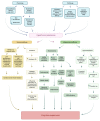Homocysteine, Cognitive Functions, and Degenerative Dementias: State of the Art
- PMID: 36359260
- PMCID: PMC9687733
- DOI: 10.3390/biomedicines10112741
Homocysteine, Cognitive Functions, and Degenerative Dementias: State of the Art
Abstract
There is strong evidence that homocysteine is a risk factor not only for cerebrovascular diseases but also for degenerative dementias. A recent consensus statement renewed the importance and the role of high levels of homocysteine in cognitive decline in several forms of degenerative dementia, such as Alzheimer's disease. Although the molecular mechanisms by which homocysteine causes cell dysfunction are known, both the impact of homocysteine on specific cognitive functions and the relationship between homocysteine level and non-Alzheimer dementias have been poorly investigated. Most of the studies addressing the impact of hyperhomocysteinemia on dementias have not examined the profile of performance across different cognitive domains, and have only relied on screening tests, which provide a very general and coarse-grained picture of the cognitive status of the patients. Yet, trying to understand whether hyperhomocysteinemia is associated with the impairment of specific cognitive functions would be crucial, as it would be, in parallel, learning whether some brain circuits are particularly susceptible to the damage caused by hyperhomocysteinemia. These steps would allow one to (i) understand the actual role of homocysteine in the pathogenesis of cognitive decline and (ii) improve the diagnostic accuracy, differential diagnosis and prognostic implications. This review is aimed at exploring and revising the state of the art of these two strictly related domains. Suggestions for future research are provided.
Keywords: Alzheimer’s disease; cognitive functions; degenerative dementias; dementia; homocysteine; hyperhomocysteinemia; non-Alzheimer dementias.
Conflict of interest statement
The authors declare no conflict of interest.
Figures


References
-
- Sachdev P.S., Lipnicki D.M., Kochan N.A., Crawford J.D., Thalamuthu A., Andrews G., Brayne C., Matthews F.E., Stephan B.C., Lipton R.B., et al. The Prevalence of Mild Cognitive Impairment in Diverse Geographical and Ethnocultural Regions: The COSMIC Collaboration. PLoS ONE. 2015;10:e0142388. doi: 10.1371/journal.pone.0142388. - DOI - PMC - PubMed
Publication types
LinkOut - more resources
Full Text Sources

